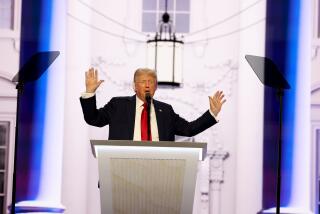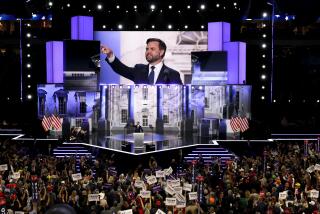Bush, in Address to Veterans, Defends His Halt to Gulf War
- Share via
CHICAGO — While jabbing at Bill Clinton with a pointed testament to the value of military service, President Bush also presented American Legionnaires here with an elaborate defense of his decision 18 months ago to halt the Gulf War.
On a day when aides hoped to exploit veterans’ doubts about Democratic nominee Clinton’s draft record, Bush’s address to the group’s national convention appeared to reflect concern that his own failure to oust Saddam Hussein could become a vulnerability.
Bush was expected today to order U.S. warplanes to step up pressure on a defiant Baghdad, and some aides said they were apprehensive that the allied imposition of a “no fly zone” in southern Iraq would also remind critics of what the war left undone. The zone is intended to keep Iraqi planes from being used against the Shiites.
As if to deflect such criticism, Bush used part of his 29-minute address to challenge those with “the gall to say” that he erred in halting Operation Desert Storm on Feb. 27, 1991--when U.S. forces remained well short of Baghdad.
He insisted that Gen. H. Norman Schwarzkopf, commander of all allied forces in the war, had urged him to “stop the killing” and painted a vivid description of the scene in the Oval Office as he reached his decision. ‘I don’t like this historical revision,” he said. “We did the right thing; we did the compassionate thing as well.”
Bush said the chairman of the Joint Chiefs of Staff picked up the phone in the Oval Office and called Schwarzkopf in Saudi Arabia to be sure that he agreed the war should be stopped. After the war, however, Schwarzkopf told an interviewer that he had recommended the allies keep fighting. He later apologized for those remarks and said he had concurred with Bush’s decision.
The President has previously scorned as hindsight those who have criticized his Administration’s support for Iraq before the Gulf War. But his rebuttal Tuesday marked the first time he has felt compelled to volunteer a defense of the way he waged the war itself.
Polls still show Bush holding an advantage over Clinton when voters are asked which candidate can best manage foreign policy. But that Republican edge has diminished in recent months.
And, in a sign that Bush may once again be slipping in the polls, a New York Times/CBS News survey showed Clinton regaining much of the ground he lost immediately after the GOP convention. CBS reported that Clinton now leads, 55% to 39%.
Wearing an American Legion overseas cap, Bush--a self-proclaimed member-for-life of Post 77 in Houston--reminded the Chicago audience that he had served during World War II.
In a reference that drew an obvious contrast with his Democratic rival, Bush said that when he ordered American forces into combat in Panama and Iraq, he kept his own experience in mind.
“As President,” he said, “with that experience behind me and mindful of the trust of everyone who would serve, my sense of duty was magnified a thousand times.”
Bush avoided direct references to Clinton. But he echoed earlier criticism of his rival’s domestic-policy-oriented address before the Democratic Convention and said: “Foreign policy is not a footnote, a loose end that we wrap up and then safely forget. It requires a steady, experienced leadership.”
Bush received approving, but less than enthusiastic applause.
The President sought to mute his tone during what he cast as a nonpolitical address. But he turned more forceful at a campaign appearance later in the day.
Campaigning in Ypsilanti, Mich., near a sprawling automobile plant that General Motors has targeted for closure, Bush told a rally that Clinton’s proposal to impose more stringent fuel efficiency standards would cost 40,000 jobs.
The GOP has been using figures from a study by the Motor Vehicle Manufacturers’ Assn., which assumes that car companies would lay off all their workers and close all assembly lines making cars that do not meet the tougher standard.
Bush would preserve a current standard that requires manufacturers to ensure that the average automobile in their fleet travels at least 27.5 miles on a gallon of gas.
Clinton has said he favors a plan to tighten that standard to 40 m.p.g. by the year 2000, a proposal bitterly opposed by American auto makers. But he has also sought to assuage the fears. Last weekend, he said he was “flexible” and suggested he might set “separate goals for different sized cars.”
That Bush devoted so much time to the Gulf War earlier in the day served as a reminder of the lasting discomfort that Schwarzkopf’s post-war comments have caused the White House.
In a March, 1991, interview with David Frost, Schwarzkopf said that his “recommendation” to Bush was to continue fighting. “We had them in a rout, and we could have continued to reap great destruction on them,” he said.
The general later apologized for his remarks and said he had concurred with Bush’s decision to halt the fighting. He said his comments reflected “initial planning” to continue the war until Iraq’s elite army units were destroyed.
But the reminder that allied forces could have imposed further destruction on Iraq inspired 18 months of second-guessing that intensified as it became more apparent that Hussein had consolidated his power. Some Democrats and Republicans have suggested that U.S. forces should have marched into Baghdad to ensure that Hussein--whom Bush had accused of war crimes and compared to Hitler--was overthrown.
Bush painted an unusually precise scene of an Oval Office meeting on Feb. 27, 1991, in which he and his top national security advisers discussed whether to call off the attack. After Defense Secretary Dick Cheney and Joint Chiefs of Staff Chairman Colin L. Powell had recommended that “we stop the slaughter,” Bush said he had asked: “Are you sure our field commanders feel this way?”
He said that Powell picked up a secure phone and dialed Schwarzkopf in Saudi Arabia. “Gen. Powell looked up at me after he had talked to Schwarzkopf and said: ‘Mission accomplished, stop the killing,’ ” Bush said. “And he was right. We are not in the slaughter business.”
But in the a vast ballroom filled with Legionnaires, a series of random interviews found that Bush’s choice had left some veterans uneasy.
“I don’t know whether he completed the job or not,” said Winston Greene, 77, a World War II veteran from Mansfield, Ohio. “But if he didn’t, he’s going to have to.”
Added Gary Harris, 40, of Toledo, Ohio: “He kind of let us down.”
More to Read
Get the L.A. Times Politics newsletter
Deeply reported insights into legislation, politics and policy from Sacramento, Washington and beyond. In your inbox twice per week.
You may occasionally receive promotional content from the Los Angeles Times.










